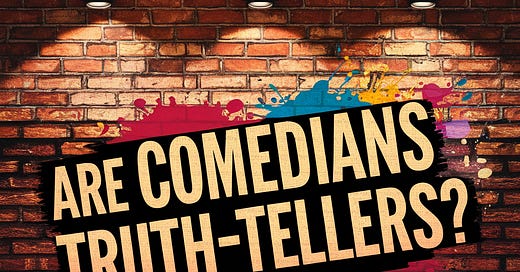From time to time I’ve made the point that comedians and preachers are similar in that they stand in front of people and tell the truth. Well, at least comedians do. (Kidding.) The reality is: comedy is truth-telling…kind of. Increasingly, I hesitate to say that because I don’t want every joke to be looked at as though it’s a political manifesto or a sacred revelation. But I mean it.
Or probably what I mean, what’s more on point is this: comedy’s relationship with truth is like an airplane lavatory—slippery and complicated. That’s because stand-up operates in this sort of liminal space where the comedian seems to be sharing real, honest moments—but the truth is often bent, exaggerated, or outright made up. So, what they’re saying is real, honest, and true…kind of. And here’s the kicker: I don’t think that’s a flaw; rather, I kind of think that’s the whole point. People enjoy being tricked and surprised.
I like how Robert Bethke once put it. Stand-up is something like tall tales. He describes the stand-up’s stories as “extraordinary adventures and fantastical achievements”1 that live inside this testimonial style where you’re supposed to believe they could have happened—even if they didn’t. It’s not about the literal truth. It’s about the worldview being revealed or, better yet, the absurdity of the human experience being highlighted. Or as Ian Brodie puts it in Vulgar Art, “To dispute the history, the truth of the events, is to miss the point.”2 In other words, nobody’s fact-checking Paul Bunyan’s blue ox, and nobody should be fact-checking a comedian’s closer. People who do have all but missed it.
This came up for me recently during a set. I was telling a joke about crashing a vehicle—not your typical fender bender but a ridiculous, over-the-top scenario that thankfully got a good laugh. Right as the laughter died down, this woman in the front row asked, “That’s true?! That really happened?!” I didn’t answer. I just laughed and kept going. Not because I wanted to be mysterious, but because her question wasn’t the point. Whether it happened or not didn’t matter and doesn’t matter. What mattered was the absurdity of the story and how it landed with the audience. The truth was irrelevant. The laugh was everything.
That’s what makes comedy so unique. It dances between fact and fiction, using whatever tools it needs to pull the audience into a shared moment of hilarity. A good joke doesn’t have to be real, at least not in the sense that it’s completely factual. I heard a comedian spin a completely wild and absurd story about outer space the other night, something no one in the room believed, but it hit. The audience loved it because, regardless of how stupid or insane the story was, they got on board with that particular “tall tale.” Put another way: laughter isn’t about the truth of the narrative; it’s about the truth of the experience it creates.
That’s a reason I think stand-up is so fascinating. On one level, it feels like one of the most honest art forms there is. Typically, you’re alone on stage with nothing but a microphone, telling your version of things. But on another level, there are smoke and mirrors. You’re creating a shared illusion, bending the truth if you need to just to make it funny. The trick isn’t to tell the truth; it’s to tell a version of it that resonates, surprises, and most importantly, gets a laugh.
So yeah, comedy is truth-telling…kind of. But the truth isn’t found in detailed facts and accuracy; it’s found in the connection between the comedian and the audience. For comedians, that’s the most important thing anyway! Comedy isn’t about whether the story really happened. Because at the end of the day, nobody’s leaving a comedy show wondering if they need to fact-check my story about crashing a vehicle. Instead, they’re leaving with the memory of laughing so hard that, on the way home, they almost crashed their own.
Bethke, Robert D. “Storytelling at an Adirondack Inn.” Western Folklore 35.2 (1976): 123–39.
Brodie, Ian. A Vulgar Art: A New Approach to Stand-Up Comedy (FSMW; Jackson, MS: University Press of Mississippi, 2014), 24.




